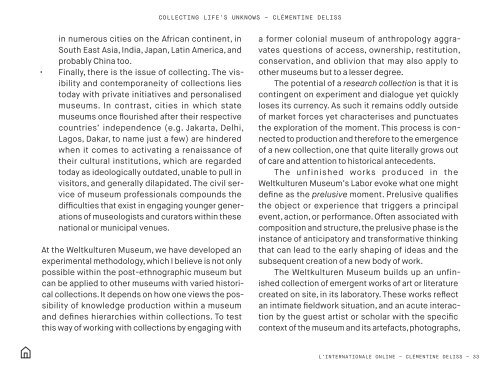DECOLONISING MUSEUMS
decolonisingmuseums_pdf-final
decolonisingmuseums_pdf-final
Create successful ePaper yourself
Turn your PDF publications into a flip-book with our unique Google optimized e-Paper software.
COLLECTING LIFE’S UNKNOWS – CLÉMENTINE DELISS<br />
in numerous cities on the African continent, in<br />
South East Asia, India, Japan, Latin America, and<br />
probably China too.<br />
• Finally, there is the issue of collecting. The visibility<br />
and contemporaneity of collections lies<br />
today with private initiatives and personalised<br />
museums. In contrast, cities in which state<br />
museums once flourished after their respective<br />
countries’ independence (e.g. Jakarta, Delhi,<br />
Lagos, Dakar, to name just a few) are hindered<br />
when it comes to activating a renaissance of<br />
their cultural institutions, which are regarded<br />
today as ideologically outdated, unable to pull in<br />
visitors, and generally dilapidated. The civil service<br />
of museum professionals compounds the<br />
difficulties that exist in engaging younger generations<br />
of museologists and curators within these<br />
national or municipal venues.<br />
At the Weltkulturen Museum, we have developed an<br />
experimental methodology, which I believe is not only<br />
possible within the post-ethnographic museum but<br />
can be applied to other museums with varied historical<br />
collections. It depends on how one views the possibility<br />
of knowledge production within a museum<br />
and defines hierarchies within collections. To test<br />
this way of working with collections by engaging with<br />
a former colonial museum of anthropology aggravates<br />
questions of access, ownership, restitution,<br />
conservation, and oblivion that may also apply to<br />
other museums but to a lesser degree.<br />
The potential of a research collection is that it is<br />
contingent on experiment and dialogue yet quickly<br />
loses its currency. As such it remains oddly outside<br />
of market forces yet characterises and punctuates<br />
the exploration of the moment. This process is connected<br />
to production and therefore to the emergence<br />
of a new collection, one that quite literally grows out<br />
of care and attention to historical antecedents.<br />
The unfinished works produced in the<br />
Weltkulturen Museum’s Labor evoke what one might<br />
define as the prelusive moment. Prelusive qualifies<br />
the object or experience that triggers a principal<br />
event, action, or performance. Often associated with<br />
composition and structure, the prelusive phase is the<br />
instance of anticipatory and transformative thinking<br />
that can lead to the early shaping of ideas and the<br />
subsequent creation of a new body of work.<br />
The Weltkulturen Museum builds up an unfinished<br />
collection of emergent works of art or literature<br />
created on site, in its laboratory. These works reflect<br />
an intimate fieldwork situation, and an acute interaction<br />
by the guest artist or scholar with the specific<br />
context of the museum and its artefacts, photographs,<br />
L’INTERNATIONALE ONLINE – CLÉMENTINE DELISS – 33


